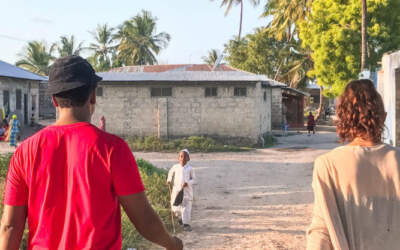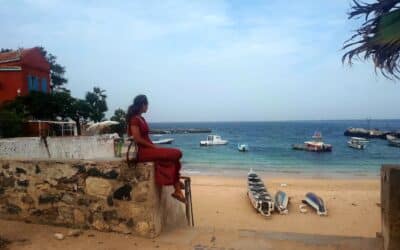Over-tourism- how traveling affects the world
Over-tourism has long become a buzzword. Cities, Islands, and entire countries are creaking under the weight of too many visitors. Locals’ lives change drastically as prices rise and an increasing amount of living space is allocated to accommodate tourists.
But what exactly is over-tourism?



[Overtourism] is the phenomenon of a popular destination or tourist attraction being overrun by tourists in an unsustainable way;.
That’s the way British journalist Greg Dickinson defined the term.
Over-tourism has become a buzzword regarding the adverse effects of tourism. However, the problem itself has been known for much longer. Nevertheless, the topic did not attract media attention until a sudden outcry from the population of affected cities and regions and a trend towards more sustainable tourism practices.
In recent years travel has become a mass product. Hence, with increased airlines and airfares, the evolution of Airbnb has made traveling affordable to the broad masses.
We started consuming traveling the same way we did with food and clothing, too much with too little respect for environmental impacts. On the quest for utmost tranquility and relaxation, people stopped traveling to explore and often brought little interest in the county visited beyond the borders of the chosen resort. Often we listen to locals complaining about visitors who are not interested or even appear scared.

Tourism – a two sided sword
Our visit to Chefchaouen prompted us to discuss the topic of over-tourism. The picturesque blue city in Morocco has become one of the Instagram hotspots.
Here you queue up for a photo. Unfortunately, we felt that enthusiastic crowds of tourists took over the place. We felt a bit like intruders in people’s homes. Over-tourism has left its mark on many areas, from overcrowded cities to displaced locals to the loss of authenticity of entire islands and neighborhoods.
Traveling has become a mega industry in recent years and continues to grow. We love traveling, and so do millions of others. Usually, it is also one of our favorite things to write about. Yet, we feel like it’s time to express some concerns and worries.
Social Media & Tourism
We are lucky to live in times where we get to explore the world so freely. Yet, we should remember that traveling offers unique ways to overcome cross-cultural prejudices and fears and establish empathy and understanding. Therefore, we can’t allow tourism to exceed its capacities. Especially in social media, it becomes even more critical to connect to a country and its people. A destination is always more than an Instagram post! It’s in our hands to choose our destinations wisely and responsibly. Undoubtedly, the world holds lots of beautiful places, but we should never forget the people who call the area their home. If you are interested in becoming a more responsible traveler, check out our guide on becoming a more responsible traveler.

Over-tourism and its impact
Europe, in particular, as the world’s largest tourist destination, is at great risk. People in cities like Venice and Barcelona suffer from dramatic cuts in their daily lives.
The Philippines and Thailand had to take even more drastic measures to recover from several years of over-tourism. Several beautiful beaches and islands were closed to give nature and wildlife time to regenerate.
The majority of the tourism industry doesn’t measure its success in term of workplaces created but in terms of absolute visitor numbers. The superlative wins. For many years there has been no regard for the impact of those high numbers. Souvenirs nowadays are even mass-produced abroad and shipped back to the destination.
How to lessen the impact of over-tourism
1. Travel slow and take your time
The paradise in Bali has almost collapsed because there were too many, too fast offers. “Bali – for ten days all-inclusive, super cheap.” Too many people have hit, so Bali quickly became one of the hippest travel destinations. As a result, there are polluted coastal sections and unfortunate islanders who suffer from the increasing garbage problem.
2. Travel during low season
This is our travel advice number one! We always try to avoid the peak travel times of the tourist strongholds! Especially if we visit popular destinations like Zanzibar or Belize.
3.Do your research before you go!
Choosing locally-owned, eco-friendly accommodations and tour providers is not a question of budget or hippie travel. It’s about accepting responsibility and stepping up!
4. Consume locally
Give the local specialties a try! While everything may not be the same as at home, it’s a new experience, and that’s what we travel for, isn’t it?
5. Travel of the beaten path!
Find destinations away from mass tourism. So many beautiful places are waiting to be explored.
El Salvador: The small country hardly knows what tourism means; nevertheless, it is our dream destination number one. Beach&Surfing, city&culture, volcanoes&lakes. Beyond that, El Salvador is a safe travel country for tourists.
Understanding over-tourism
How we treat destinations
Many tourists are seeking a break from everyday life. Life at home is becoming increasingly stressful and fast. Hence, they are looking to treat themselves. A lot of comfort for little money, a break from everyday life, all-inclusive, without having to worry about anything.
We care about our trash, water, and electricity usage at home. So why should we also be worried about it on our time-out?
We all want to know the famous cities, the best beaches, and the most breathtaking world views. But the places lose their magic, their character. The locals flee or, worse yet, become frustrated, and their authentic life gets lost.
Many countries hold hardly discovered pieces of jewelry and genuine travel alternatives. And actually, we all want to be unique and individual somehow, so we must stop traveling to the same places all the time!

What is tourism leakage?
Out of every $100 spent on vacations in developing countries only $5 stay there. Developing countries, however, get a full serving of environmental pollution, increasing noise and air pollution, rising prices, and mountains of rubbish. On top of that, the masses become disruptive in everyday life, causing entire villages and towns to lose their original charm and inhabitants. A UN study of 1996 found that the net income of tourism in the Caribbean is more significant to the industry than to the actual net income of the respective countries.
What’s causing tourism-leakage?
1) Our comfort often has to be imported. Especially developing countries can facilitate the mass production and supply of many commodities. Hence they are imported to satisfy visitors. So what stays in the trash.
2) Massive tourist facilities require massive investments. This can often not be paid for by local investors. International investors or holdings own many big chains or even resorts. The profits made usually leave the country directly.
LARQ Water Bottle Review: Honest Insights on Purification and Filtration
Curious about the LARQ water bottle? In this review, I share my personal experience testing the LARQ Bottle PureVis™ 2, including its UV-C purification, filtration features, and whether it’s worth the investment for safe, clean water on the go.
Great Huts: Eco Paradise on the Edge
Duration: at least 3 days Budget: $ 125 per dayFor years I sat on Boston Bay’s sand, staring at the high cliff across the water. I could just make out a pair of stone pools clinging to the edge and a wooden gate marked Great Huts. I kept wondering, What’s up there?...
Is it still ok to book an AirBnb?!
Wondering if it’s still ethical to book an Airbnb? Explore the pros and cons through a lens of sustainable and fair tourism. Learn how your choice impacts local communities, housing markets, and the environment, plus tips for booking responsibly.
Yunguilla | Community Tourism in Ecuador’s cloud forest
Discover Yunguilla, a sustainable project by 30 indigenous Quichua families in Ecuador’s cloud forest. Enjoy eco-friendly farming, bird-watching, waterfall treks, and cultural workshops since 2000.
Exploring the Essence of Community Tourism
Discover how community tourism offers authentic travel experiences by connecting with locals, supporting sustainable initiatives, and preserving cultural heritage. Explore personal stories, hidden gems, and meaningful adventures that inspire a deeper connection to the places you visit.
Supergoop sunscreen review | Is it worth the extra $$$ ?
I’ve become quite the sunscreen connoisseur. And let me tell you, Supergoop has completely revolutionized my travel skincare game. Here’s why I’m head over heels for their products and why I think every traveler should give them a try.
The Ultimate Guide to Vegan Sunscreen: Protect Your Skin Ethically in 2024
Discover the best vegan sunscreens! Learn about cruelty-free, plant-based ingredients that shield your skin from harmful UV rays while aligning with your ethical choices. Dive in now!
My Global Quest for the Best Natural Deodorants
I’m about to take you on a whirlwind tour of the best natural deodorants for women in 2024. Trust me, your armpits (and your travel companions) will thank you later!
Cultural Sensitive Travel | A Guide to Respectful Travel
Travel is undeniably a privilege, often inaccessible to many locals due to visa restrictions and lingering effects of colonial history. Acknowledging this privilege highlights the importance of practicing cultural sensitivity and ensuring that tourism positively impacts the vibrant communities of the Caribbean.
Self cleaning bottles vs Water filters Reviewed
Self Cleaning bottles have taken the market by storm. As I traveler I am wondering if they are a better solution than water filters to avoid plastic bottles. Find out if a self-cleaning or a filter bottles is right for you.









